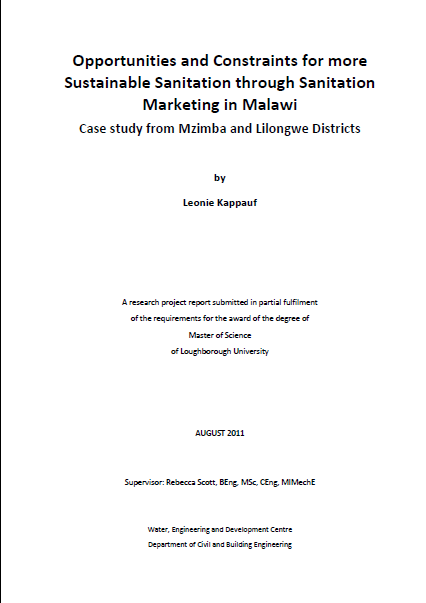Opportunities and constraints for more sustainable sanitation through sanitation marketing in Malawi - Case study from Mzimba and Lilongwe districts
Kappauf, L. (2011)

Published in: 2011
Author:
Kappauf, L.
Uploaded by:
SuSanA secretariat
Partner profile:
common upload
6867 Views
207 Downloads
Location of library entry
Content - Summary
This MSc thesis gives an overview of opportunities and constraints for more sustainable sanitation through the application of sanitation marketing approaches in rural Malawi. The thesis is based on the results of a field research in Lilongwe and Mzimba district in Malawi and considers three stakeholder levels: the rural population (demand site), entrepreneurs involved in sanitation supply (supply site) and the district governments (enabling environment). The potential of sanitation marketing in rural Malawi needs to be assessed within the context of the lessons learnt from the on-going CLTS implementation.
Sanitation marketing approaches are becoming increasingly popular with many stakeholders in the Malawian sanitation sector. In 2011 the GoM with support of the World Bank Water and Sanitation Program for Africa (WSP-AF) has launched a sanitation marketing campaign in low-income urban areas of Lilongwe and Blantyre.
Nevertheless, from the past experiences, there is little evidence for the potential of sanitation marketing to sustainably change behaviours and increase coverage of improved sanitation in Malawi. The assessments done within the framework of the CLTS implementation have shown that there are structural and/or institutional constraints for successful sanitation promotion), which might also challenge the introduction and/or scale up of sanitation marketing.
The objectives of the research were therefore:
1.Analysis of the district governments’ roles and capacity in the implementation of sanitation marketing.
2.Analysis of the private sector’s capcacity to provide sanitation technologies and services.
3.Analysis of the capacity of communities to respond to sanitation marketing approaches
Bibliographic information
Kappauf, L. (2011). Opportunities and constraints for more sustainable sanitation through sanitation marketing in Malawi - Case study from Mzimba and Lilongwe districts.
Filter tags
Case studies in other formats English Rural Sub-Saharan Africa















